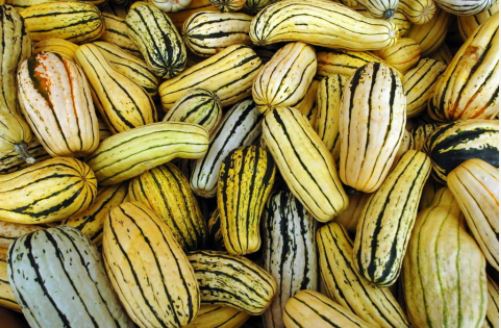Lifestyle
5 astounding health benefits of Delicata squash

Delicata squash – also called Bohemian squash, sweet potato squash, sweet dumpling squash or peanut squash – is a winter squash known for its myriad of health benefits.
It belongs to the same species as acorn and spaghetti squash. Delicata squash is cylindrical in shape, has a cream or pale orange exterior with green or dark orange stripes and has a sweet flavour.
The exterior of this type of squash is delicate than other types of squash, hence its name delicata.
Delicata squash when cooked holds its shape, which is why it can be perfectly baked and stuffed with meat, quinoa and other nutritious foods.
Here are 5 health benefits of Delicata squash:
1. Keeps digestive system healthy
Delicata squash contains a significant amount of dietary fibre, especially the skin. Fibre plays an important role in digestive health. It keeps the digestive system healthy, by helping in digestion and keeping your bowel movements soft and regular. Increasing the amount of dietary fibre has been shown to significantly reduce the risk of coronary heart disease, obesity, diabetes, high blood pressure and certain gastrointestinal diseases.
2. Builds strong bones
Delicata squash contains a good amount of calcium, an essential mineral that is needed for bone development and bone maintenance. An optimal calcium intake is necessary for lowering the risk of osteoporosis.
3. Supports eye health
Delicata squash is a good source of vitamin A, an important vitamin that plays a vital role in good vision; it helps maintain a clear cornea and allows you to see in low light conditions. A high intake of vitamin A helps reduce the risk of cataracts and age-related macular degeneration.
4. Promotes healthy red blood cell production
As delicata squash possess a significant amount of iron, consuming this vegetable will aid in healthy red blood cell production. Iron is an essential component of haemoglobin, a protein found in the red blood cells that carry oxygen in your blood throughout the body.
5. Boosts immunity
The vitamin C content in delicata squash can aid in boosting your immunity. Vitamin C, a water-soluble vitamin plays a key role in immune function; it helps ward off common cold and other infectious diseases that attack the immune system. In addition, vitamin C is required for the growth and repair of tissues in the body.
How to select and store delicata squash
Select a delicata squash that is firm, heavy and cream in colour. Avoid delicata squashes that have dark spots, dull or wrinkled skin and are extremely light in size. Ripened delicata squash will be yellowish with green stripes and unripe ones are light green in colour. You can store delicata squash in a cool and dry place for about three months.
Ways to eat delicata squash
- You can make delicata squash puree and add it to your soup.
- You can use delicata squash as a stuffing to your favourite recipes.
- Slice and roast delicata squash tossed in olive oil and salt.
- Add slices of delicata squash to your home-made pizza.
- Add baked delicata squash to your favourite hummus recipes






